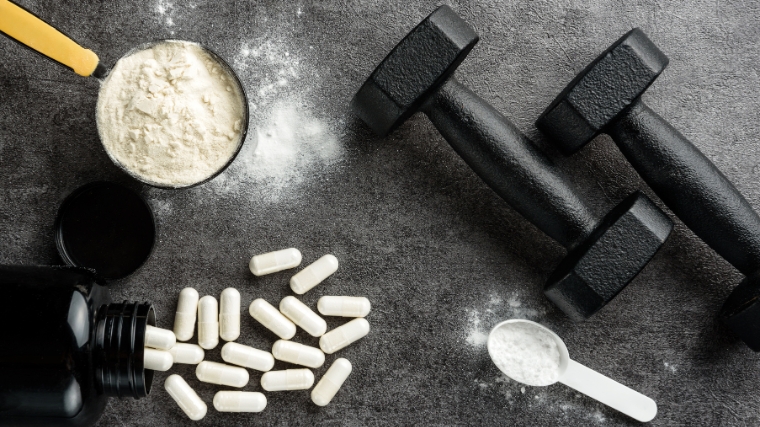If you’ve been crushing it in the gym lately but hitting plateaus, you may have considered boosting your energy with different types of supplements. Your pre and post-workout nutrition can play a significant role in your results, and both can be a welcome addition to a diet already packed with protein.
Two of the most common supplements gym-goers turn to for an performance boost are creatine and pre-workout. Creatine is an amino acid that plays a role in energy production for high-intensity exercise and may boost muscle protein synthesis after training. Pre-workout contains various ingredients like caffeine to improve your feelings of focus and energy.

In the battle of creatine versus pre-workout, you should consider what type of training you’ll be doing and if you’re looking for supplements to help you build muscle, boost athletic performance, or improve your muscle recovery. We’ll dive into the science behind the two supplements, which one to take, and when below.
- What Is Creatine?
- What Is Pre-Workout?
- Creatine Vs. Pre-Workout for Muscle Growth
- Creatine Vs. Pre-Workout for Athletic Performance
- Creatine Vs. Pre-Workout for Recovery
- When to Take Both Creatine and Pre-Workout
- Your Takeaways
Editor’s Note: The content on BarBend is meant to be informative in nature, but it should not be taken as medical advice. When starting a new training regimen and/or diet, it is always a good idea to consult a trusted medical professional. We are not a medical resource. The opinions and articles on this site are not intended for use as diagnosis, prevention, and/or treatment of health problems. They are not substitutes for consulting a qualified medical professional.
[Read More: The Best Creatine Supplements]
What Is Creatine?
Creatine is an amino acid that is found mainly in your skeletal muscles and your brain. (1) It occurs naturally in your body. However, you can produce more of it by synthesizing three other amino acids: arginine, glycine, and methionine. (2)
After ingesting creatine, your body stores it as creatine phosphate. Phosphagens play a role in energy availability, and phosphocreatine helps produce and replenish ATP (or adenosine triphosphate) — the energy currency of the cell utilized for high-intensity, short-duration exercise like sprinting and powerlifting. (3) ATP helps your muscles contract when you do these activities.

[Read More: Does Creatine Make You Gain Weight?]
Your body can access and use ATP for about one to three seconds before it needs to replenish its stores. Having more stored phosphagens in your system helps to speed up ATP reproduction, and more ATP may help increase your strength and power output. Due to its role in ATP production, creatine has been shown to help boost athletic performance during high-intensity training. (3)
Some studies suggest that creatine supplementation may aid in muscle protein synthesis, since it is an amino acid and is stored in skeletal muscles. (4)
Sources of Creatine
You can get creatine through supplementation or by consuming foods with creatine. There are different types of creatine supplements, with creatine monohydrate being the most studied in strength athletes. (5)
Creatine is a carninutrient, meaning it can only be found in animal-based protein sources. (2) Vegans can eat foods containing precursors to creatine synthesis — the amino acids arginine, glycine, and methionine. (2)
Listed below are some ample creatine sources and precursors for vegans:
- Creatine Monohydrate Supplements
- Creatine HMB Supplements
- Creatine HCI Supplements
- Creatine Kre-Alkalyn Supplements
- Steak, Ground Beef
- Poultry
- Herring, Salmon, Tuna, Cod
- Parmesan Cheese
- Pumpkin Seeds, Sesame Seeds
- White Beans
- Walnuts, Almonds
[Read More: The Best Pre-Workout Supplements]
What Is Pre-Workout?
Pre-workout is any substance that you ingest before a workout to enhance your training. It’s meant to boost your performance in the gym by enhancing your focus and reducing your fatigue. Available in liquid, powder, and gummy form, this jolt juice contains different combinations of ingredients, with most consisting of caffeine, beta-alanine, citrulline, taurine, and even creatine. (6)
More focus can help you maintain proper form during your session. More energy and less fatigue may help you train for longer. Put a different way: Pre-workout doesn’t directly grow your muscles or increases your vertical. However, over time, more productive workouts will add up to to long-term noticeable gains.

[Read More: The Complete Guide to Pre-Workout Supplements]
Scientific research on the effectiveness of pre-workout is scant. However, gym-goers have been consistently buying pre-workout supplements since they became popular in the bodybuilding community in the 1990s. By 2019, Grandview Research valued the Global Pre-workout market at $12.1 billion. (7) The demand continues to grow.
Sources of Pre-Workout
Whether you choose a powdered pre-workout supplement or consume a combination of nutrients through natural food and beverage sources, pre-workout may help you bust through plateaus and reach your training goals.
Pre-workout supplements can include caffeine for energy, nitric oxide boosters for improved blood flow, BCAAs for muscle-building, and many other substances. Even consuming salt pre workout may be an effective training booster.
Below are some types of pre-workout supplements:
- Citrulline Supplements
- Beta-Alanine Supplements
- Taurine Supplements
- Tyrosine Supplements
- Caffeinated Beverages
Creatine Vs. Pre-Workout for Muscle Growth
Building muscle is a simple, but not easy. Lift weights with progressive overload and eat enough calories and protein to make gains. If you’re looking to kick it up a notch with a supplement, let’s look at the difference between pre-workout and creatine for muscle growth.
For over 50 years, creatine has been heavily researched and shown to help increase lean muscle mass (or hypertrophy) when combined with a resistance training program. (8) In 2022, a review was published, wherein researchers reviewed 35 studies focusing on adults supplementing with creatine combined with resistance training, mixed exercise, and no exercise. The groups that combined creatine with resistance training gained two pounds of lean body mass. The groups performing mixed or no exercise saw no significant gains. (9)
Creatine increases energy availability in your cells but it doesn’t provide the same energy (and feeling of energy) that a pre-workout does. Pre-workout contains different ingredients that help you feel focused, energized, and less fatigued while working out. When you’re training for hypertrophy, pre-workout can give you a mental boost the stamina to endure high-volume workouts.
Creatine is associated with energy for short-duration, highly intense activity. You can also build muscle through longer sets at lighter weights, and pre-workout, not creatine, is the better aid in this scenario. However, when it comes to actually building muscle mass the creatine in your system is going to take you that extra mile. Research on pre-workout is varied and typically not associated with directly gaining muscle. (10)
The Winner
Creatine keeps your ATP stores full and replenishes them quickly to help you get the most out of your muscle-building reps. Pre-workout gives you a feeling of energy and focus you need in the gym. But with 50 years of research showing the ability of creatine to aid in building muscle mass, we have to crown creatine the winner of hypertrophy. (8)
Creatine Vs. Pre-Workout for Athletic Performance
When supplementing to boost your athletic performance, consider the type of training you’re going to do.
Creatine helps replenish ATP to provide energy for activities like sprinting, plyometric exercises, and heavy lifting. It may help decrease rest time in between sets. When you’re working on your one-rep max (1RM), creatine can give you an extra advantage. In a study on creatine supplementation in young adults during a six week training program, participants increased their overall body strength and weight used in the chest press and leg press. (11)
[Read More: The Strongest Pre-Workouts For Pump, Focus, Tingles, And More]
Different ingredients in pre-workout can help boost your athletic performance in different types of exercise. Caffeine can help you feel more alert and energized for longer training sessions. Nitric oxide boosters, a common pre-workout ingredient, helps to increase vasodilation or blood flow to deliver oxygen to your muscles. Some research shows nitric oxide benefits to be that you can endure longer-duration aerobic exercise. (12)
If pre-workout provides feelings of energy for long durations, and creatine works for short activities, but you might be doing a long session that includes short, intense activities — can you take pre-workout and creatine? Yes. But remember that creatine provides energy at a cellular level and does not feel energizing like pre-workout does.
The Winner
When it comes to athletic performance, pre-workout wins out over creatine. It can work almost instantly and doesn’t require you to already have it in your system for weeks in advance. If you have already undergone a creatine loading phase, pre-workout may be the better choice to push you the extra mile in your day-to-day workouts. Creatine is not like pre-workout — even for short-duration, highly intense activities, it won’t give you the same sensation of increased energy and focus.
Creatine Vs. Pre-Workout for Recovery
What’s the difference between creatine and pre-workout for recovery? It’s all about the ingredients, and in this case, they may work well together.
Research shows that creatine may help improve post-exercise recovery. (13) Exercise depletes your glycogen stores for energy and creatine can help to replenish them as you recover. (1) Creatine has also been shown to potentially decrease soreness and inflammation. (1) Creatine can function as an antioxidant, due to its ability to fight free radicals and reduce oxidative stress, which is beneficial for recovery. (14)

[Read More: Omega 3 Benefits — More Muscle, Better Recovery, and Enhanced Endurance]
While creatine can replenish your glycogen stores, pre-workout food or supplements help provide the glycogen for energy through carbohydrates. Some research shows that including creatine with carbohydrates as your pre-workout may help with glycogen replenishment. (1)
Pre-workout without creatine may not impact post-exercise recovery, though you may feel you like you can recover quicker between sets and train for longer with less fatigue. If you are lifting heavy weights, creatine also helps you recover during your workout by replenishing your ATP.
The Winner
If you’re wondering if you should take creatine and pre-workout, both supplements may be a good choice for recovery. If the choice is between pre-workout or creatine, creatine wins because it impacts your biology after training is complete. Recovery strategies include adequate sleep, hydration, and nutrition. You can consume creatine as part of your diet outside of training times to reap the benefits of regenerating better before your next session.
When to Take Both Creatine and Pre-Workout
Both supplements can help you bust through plateaus and can be taken in tandem. In fact, we suggest checking the nutrition labels of other supplements you’re already taking. Certain whey protein powders and pre-workouts may already contain an effective dose of creatine (about 3-5 grams). If that’s the case, your bases are covered.
When to Take Creatine
It takes time for creatine to build up in your system — you may have heard of the creatine loading phase. This is a way of scaling up the amount of creatine in your body to saturate your muscles and phosphagen stores.
Research suggests taking five grams of creatine, four times a day, for five days to a week. (1) In the next phase of loading, you can drop to three to five grams of creatine per day to maintain your muscle. Larger people may need up to 10 grams per day. (1)
[Read More: The Effects of Creatine and Caffeine When Taken Together]
Creatine’s function isn’t to provide quick feelings of energy like pre-workout, so the timing of ingestion during the day matters less. (1) It’s more important to hit your creatine goals throughout the day over a period of time. The recommended creatine dosage based on research is three to five grams a day or 0.1 grams per kilogram of body weight per day. (15)
When to Take Pre-Workout
Pre-workout supplements can be taken 30 to 60 minutes before training for energy and focus. Ingredients matter in pre-workout, so if you’re looking to build muscle, choosing one with BCAAs may help to stimulate anabolic signaling. (16)
If you’re taking a stim based pre-workout, it likely includes caffeine and is optimal for morning or early workouts. If you train later in the afternoon or evening, a non-stim pre-workout may be a better choice. Some research shows that caffeine taken less than six hours before bed may negatively affect your sleep. (17)

[Read More: Anabolic Vs. Catabolic — How to Build Muscle and Keep It]
When choosing a stim pre-workout, watch out for banned substances. Ingredients like dimethylamylamine (DMAA) are banned by the World Anti-Doping Agency (WADA) and can be detrimental to your health. (18)
Your Takeaways
Creatine is not the same as pre-workout but they can both play important parts of a training program.
- Creatine is an amino acid found in animal protein and supplements stored in your skeletal muscles and brain.
- Pre-workout is a food or supplement ingested before training to enhance feelings of energy and focus.
- Creatine may be more beneficial for muscle growth than pre-workout due to its role in muscle protein synthesis.
- Pre-workout is more immediately available for boosting energy, which may be preferred for athletes looking to improve their performance.
- Both creatine and pre-workout can improve exercise recovery when taken together, but creatine has more of an impact on replenishing your glycogen stores and reducing oxidative stress.
- All humans can benefit from getting adequate creatine in their diet. Athletes focused on heavy lifting and building muscle may choose it over pre-workout. Pre-workout is helpful to boost energy and focus for all types of workouts.
More Nutrition Content
When you’re considering pre-workout versus creatine supplements, both can be beneficial to your goals. If you’re into short bursts of heavy lifting, having extra creatine stored will help you replenish your ATP and continue to go harder. Creatine will help more with muscle hypertrophy and recovery. Pre-workout will give you the boost of energy and focus you need to show up and follow through in longer sessions — even the potentially dreaded cardio day.
Choose your goal and choose your supplement. Now that the battle of creatine versus pre-workout has come to an end, check out some more of BarBend’s articles on the nutrition you need to pair with your training to get your gains.
- When To Take Pre-Workout — What’s The Best Time To Drink Your Pre-Workout Mix?
- Inside The Creatine Shortage Affecting Consumers And Supplement Brands
- 4 Nutrients Strength Athletes Need More Of After Age 50
References
- Kreider RB, Kalman DS, Antonio J, Ziegenfuss TN, Wildman R, Collins R, Candow DG, Kleiner SM, Almada AL, Lopez HL. International Society of Sports Nutrition position stand: safety and efficacy of creatine supplementation in exercise, sport, and medicine. J Int Soc Sports Nutr. 2017 Jun 13;14:18.
- Brosnan ME, Brosnan JT. The role of dietary creatine. Amino Acids. 2016 Aug;48(8):1785-91.
- Dunn J, Grider MH. Physiology, Adenosine Triphosphate. [Updated 2023 Feb 13]. In: StatPearls [Internet]. Treasure Island (FL): StatPearls Publishing; 2023 Jan-.
- Farshidfar F, Pinder MA, Myrie SB. Creatine Supplementation and Skeletal Muscle Metabolism for Building Muscle Mass- Review of the Potential Mechanisms of Action. Curr Protein Pept Sci. 2017;18(12):1273-1287.
- Hall M, Trojian TH. Creatine supplementation. Curr Sports Med Rep. 2013 Jul-Aug;12(4):240-4.
- Jagim AR, Harty PS, Camic CL. Common Ingredient Profiles of Multi-Ingredient Pre-Workout Supplements. Nutrients. 2019 Jan 24;11(2):254.
- Grandview Research. Pre-workout Supplements Market Size, Share & Trends Report Pre-workout Supplements Market Size, Share & Trends Analysis Report By Form (Powder, Capsule, Ready To Drink). https://ift.tt/F2yet8Y
- Wu SH, Chen KL, Hsu C, Chen HC, Chen JY, Yu SY, Shiu YJ. Creatine Supplementation for Muscle Growth: A Scoping Review of Randomized Clinical Trials from 2012 to 2021. Nutrients. 2022 Mar 16;14(6):1255.
- Delpino FM, Figueiredo LM, Forbes SC, Candow DG, Santos HO. Influence of age, sex, and type of exercise on the efficacy of creatine supplementation on lean body mass: A systematic review and meta-analysis of randomized clinical trials. Nutrition. 2022 Nov-Dec;103-104:111791.
- Harty PS, Zabriskie HA, Erickson JL, Molling PE, Kerksick CM, Jagim AR. Multi-ingredient pre-workout supplements, safety implications, and performance outcomes: a brief review. J Int Soc Sports Nutr. 2018 Aug 8;15(1):41.
- Mills S, Candow DG, Forbes SC, Neary JP, Ormsbee MJ, Antonio J. Effects of Creatine Supplementation during Resistance Training Sessions in Physically Active Young Adults. Nutrients. 2020 Jun 24;12(6):1880.
- Lansley KE, Winyard PG, Fulford J, Vanhatalo A, Bailey SJ, Blackwell JR, DiMenna FJ, Gilchrist M, Benjamin N, Jones AM. Dietary nitrate supplementation reduces the O2 cost of walking and running: a placebo-controlled study. J Appl Physiol (1985). 2011 Mar;110(3):591-600.
- Hall M, Manetta E, Tupper K. Creatine Supplementation: An Update. Curr Sports Med Rep. 2021 Jul 1;20(7):338-344.
- Arazi H, Eghbali E, Suzuki K. Creatine Supplementation, Physical Exercise and Oxidative Stress Markers: A Review of the Mechanisms and Effectiveness. Nutrients. 2021 Mar 6;13(3):869.
- Antonio J, Candow DG, Forbes SC, Gualano B, Jagim AR, Kreider RB, Rawson ES, Smith-Ryan AE, VanDusseldorp TA, Willoughby DS, Ziegenfuss TN. Common questions and misconceptions about creatine supplementation: what does the scientific evidence really show? J Int Soc Sports Nutr. 2021 Feb 8;18(1):13.
- Martinho DV, Nobari H, Faria A, Field A, Duarte D, Sarmento H. Oral Branched-Chain Amino Acids Supplementation in Athletes: A Systematic Review. Nutrients. 2022 Sep 27;14(19):4002.
- Drake C, Roehrs T, Shambroom J, Roth T. Caffeine effects on sleep taken 0, 3, or 6 hours before going to bed. J Clin Sleep Med. 2013 Nov 15;9(11):1195-200.
- Lesiak AD, Adams KJ, Domin MA, Henck C, Shepard JR. DART-MS for rapid, preliminary screening of urine for DMAA. Drug Test Anal. 2014 Jul-Aug;6(7-8):788-96. doi: 10.1002/dta.1540. Epub 2013 Oct 25.
Featured Image: Halk-44 / Shutterstock
The post Creatine Vs. Pre-Workout — Differences and When to Take Each appeared first on BarBend.
from BarBend https://ift.tt/1G7HPgZ
via IFTTT
Comments
Post a Comment